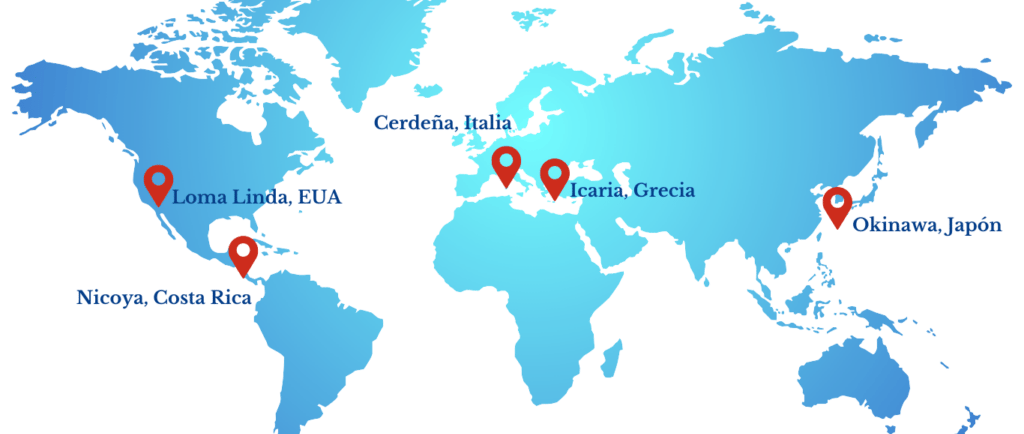Blue zones of the world
BLOG
Gerson Rivas F.
7/8/20252 min read


Coaching nutricional efectivo
Blue Zones and the Factors That Promote Human Longevity
Blue Zones are specific geographical regions where people exhibit exceptional longevity, with significantly higher rates of centenarians and a lower incidence of chronic diseases compared to the global average. The term was coined by researcher and author Dan Buettner, in collaboration with National Geographic and a team of scientists, demographers, and doctors, who identified five key regions: Okinawa (Japan), Sardinia (Italy), Icaria (Greece), Nicoya (Costa Rica), and Loma Linda (California, USA) (Buettner, 2012)
What makes these populations unique is not just the number of years they live, but the quality of those years. Most inhabitants reach advanced ages with high levels of physical functionality, stable mental health, and autonomy, suggesting that healthy longevity is deeply related to sociocultural and environmental factors.
1. Natural, Plant-Based Diet
A common characteristic across all Blue Zones is a diet that is predominantly plant-based. People consume legumes (lentils, beans, chickpeas), seasonal vegetables, local fruits, whole grains, and nuts, while red meat and ultra-processed foods are consumed very sparingly. Caloric intake is moderate, with an emphasis on fresh, low-glycemic foods, which reduces inflammation and the risk of chronic diseases like type 2 diabetes and cardiovascular disease (Willcox, Willcox & Suzuki, 2017).
2. Natural Daily Movement
Unlike industrialized societies that promote structured exercise, in Blue Zones, movement is a natural part of daily life. People walk long distances, work in their fields or gardens, and perform household tasks without relying on technology or machinery, which promotes cardiovascular, muscular, and metabolic health (Poulain et al., 2013).
3. Sense of Purpose
The "ikigai" in Okinawa and the "plan de vida" in Nicoya reflect a clear daily motivation to live. This sense of purpose is linked to a lower rate of premature mortality, a lower risk of depression, and greater life satisfaction (Buettner, 2012).
4. Stress Management
All these cultures have developed cultural mechanisms to reduce stress, which in turn decreases chronic inflammation, one of the main triggers of cellular aging. These practices include meditation, prayer, short naps, gratitude rituals, and connecting with nature.
5. Deep Social Connection
Community life, a sense of belonging, and strong family networks are essential aspects. The elderly in these communities are respected and active, which promotes emotional and mental health. Social isolation, conversely, has been linked to cognitive decline and chronic diseases (Willcox et al., 2017).
6. Spirituality and Faith
The majority of centenarians in Blue Zones regularly participate in spiritual or religious activities. In Loma Linda, for example, the Seventh-day Adventist community promotes Sabbath rest, a vegetarian diet, and abstinence from alcohol and tobacco, which has been shown to increase life expectancy by up to a decade more than the average American (Buettner, 2012).
Conclusion
Blue Zones teach us that healthy longevity is not solely the result of genetics but of lifestyle, nutrition, social environment, spirituality, and a sense of life purpose. These factors, when integrated and sustained over time, create a strong foundation for living longer and better. Promoting these habits in other parts of the world could transform public health and significantly increase the global quality of life.
Referencias:
Buettner, D. (2012). The Blue Zones: 9 Lessons for Living Longer From the People Who’ve Lived the Longest. National Geographic Books.
Poulain, M., Pes, G. M., Grasland, C., Carru, C., Ferrucci, L., & Baggio, G. (2013). Identification of a geographic area characterized by extreme longevity in the Sardinia island: The AKEA study. Experimental Gerontology, 48(2), 136–145. https://doi.org/10.1016/j.exger.2012.05.016
Willcox, B. J., Willcox, D. C., & Suzuki, M. (2017). The Okinawa Program: How the World's Longest-Lived People Achieve Everlasting Health. Clarkson Potter.
